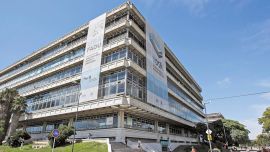Argentina’s government said on Tuesday it was willing to grant citizenship to all Nicaraguan political opposition leaders stripped of their nationality by Daniel Ortega's regime, including former vice-president Sergio Ramírez.
"Argentina is in a position to give them citizenship," said Foreign Minister Santiago Cafiero in statements to local station Radio Con Vos, stressing that it is "a personal procedure" carried out at the request of the interested party.
Cafiero said he had discussed this with President Alberto Fernández. "Argentina has always stressed the need for Nicaragua to return to respect for human rights," he said, recalling that Argentina "has condemned the persecution that many Nicaraguans have suffered."
Presidential Spokesperson Gabriela Cerruti, later indicated on Twitter that "the Argentine government is willing to grant Argentine citizenship to Sergio Ramírez, [writer] Gioconda Belli and all those who are suffering what is happening in Nicaragua."
Ramírez and Belli are among 94 opponents who were stripped of their nationality by a Nicaraguan court on February 15, describing them as "fugitives from justice" and "traitors to the homeland." In addition, all were banned for life from holding public office and had their assets confiscated.
Cafiero spoke on the subject when asked about Ramírez's statements last week that "if the Argentine government were to respond to the request for nationality for Nicaraguans, I would become Argentine," which Ramírez had told the newspaper Clarín, referring to a request to that effect from a group of intellectuals and political leaders in Argentina.
"Of course" there is the possibility of granting Argentine citizenship "to him and to all those who are also suffering what is happening in Nicaragua (...) If he asks for it, it will be given to him," Cafiero emphasised on Tuesday.
Ramírez, winner of the 2017 Cervantes Prize, fought the Somoza dictatorship (1937-1979) alongside Ortega and was vice-president during his first government (1985-1990), but distanced himself from him over disagreements within the leadership of the leftist Sandinista National Liberation Front (FSLN). In 2021 he went into exile in Spain, a country of which he is a citizen.
Spain has already offered to naturalise the 94 Nicaraguan dissidents, as well as 222 other opponents who were detained in Nicaragua and were released from prison and expelled to the United States on February 9.
Chile was the most outspoken Latin American country to condemn the measures of Ortega, whom President Gabriel Boric called a "dictator" on Saturday after expressing solidarity with opponents stripped of their nationality.
The United States, the United Nations and various NGOs have denounced the measures of Ortega, in power since 2007 and successively re-elected in disputed elections.
Ex-Montonero working for Nicaragua
Meanwhile an article in Nicaragua Investiga has revealed that former Montonero guerrilla leader Mario Firmenich has been collecting a salary from the Daniel Ortega government, even though his employment infringes Nicaraguan law as not being a citizen of the Central American country.
A privileged guest of Ortega, with whom he has been ideologically allied for almost half a century, the 74-year-old ex-guerrilla has been collecting a monthly salary of 133,710 córdobas (equivalent to US$3,735) until at least last September as a planning advisor to the presidency, a contract commencing in September, 2020. During the last two years he has lived in a house whose value is estimated at US$105,000 in an upmarket residential complex.
A central figure of the violence of the 1970s, Firmenich was convicted for his guerrilla activities in 1986 following extradition from Brazil but pardoned and released from prison in 1990 by then-president Carlos Menem. Between 1999 and 2020 he lived in Spain while his son Facundo currently lives in Bolivia.
–– TIMES/AFP



















Comments